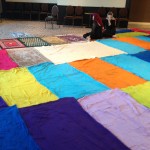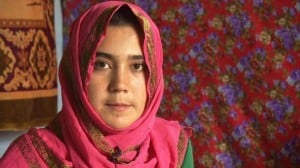As you know, last Friday was Eid-ul-Adha, a major holiday for Muslims around the world. Having enjoyed sharing our Ramadan experiences with our readers earlier this year, the MMW team wanted to briefly share some experiences and reflections on this Eid, focusing especially on the role of gender in how Eid is experienced in our respective communities. In this first segment, Anike and Izzie both reflect on the role of women in cooking and preparing food for the Eid celebrations, and on how this affects women’s experiences of Eid and access to Eid prayer. (Update: You can read part 2 here.)
Anike (Nigeria)
I spent Eid this year at hometown in Nigeria where we stayed with my grandmother in our ancestral home. This Eid was like most others I’ve spent at home; pleasantries were being exchanged as early as right after morning prayers, and they continued through the morning, with several family members coming to give their greeting. When the time for Eid prayers came, the men and children left to the mosque, leaving us women behind. Usually at this time, the women would begin cooking and preparing for the men to return so that the lambs can be slaughtered and cleaned. But this Eid was different because my mother and aunties wouldn’t have to go through the stress of meat cleaning; that task was relegated to professional cooks who had been hired by a friend of my mother’s.
When it comes to Eid and how Nigerian women experience it, all I can think of is missing Eid prayers due to cooking for the festivities. Last week I asked my aunts how many times they’d being to Eid prayers and among all of us, we concluded that we’d only gone to the prayers as children and only two or three times as adults. I can’t say that Eid is a day of celebration, relaxation or prayer for women who labour over cooking dishes in several large pots for entire households almost all day long.
Class privilege also fits into this equation. Wealthy women generally do not have to worry about being stressed by the time Eid day is over, while Muslim women from poor backgrounds, like the ones who take on cooking labours for other families, may end up spending Eid away from their families.
Izzie (India)
I was unexpectedly rushed to my husband’s hometown this Eid. His parents had gone for Hajj, and hence, we were celebrating Eid in my husband’s ancestral home where his grandparents and mother’s sisters lived.
To give you a little sneak a peek into my life, I was married this February and my husband’s home is around 500 km away from mine – which means that our cultures, food habits, accents, all of it is entirely different. I am also a working woman, which is not common in his area.
In my husband’s place, there are two major schools of thought among Muslims, and only one allows women to go to mosques. My husband’s father goes to mosques where women are allowed, but his mother’s family doesn’t, which means that I would be the only woman who goes to the Eid Gaah for prayer. My husband’s seven-year-old niece came along to give me female company. Apart from the fact that I enjoy congregational prayers and the sermon, and the whole festival feel it has to it, one major advantage of being the only woman in the house who is going to the mosque is that, once you return after the prayer, the major part of the cooking is over. And you don’t need to feel guilty that you didn’t help out. (Wicked, I know!)
Once I enter the female section of the mosque, I am overcome by body issues. Covering from head to toe, I realize, doesn’t save us from any kind of body image issues. It just gives us a different set of them. I literally feel like being pushed into a Hijab pageant, surrounded by women who just look perfect. They have the perfect skin, not to mention the crack-less feet. Most importantly, they look amazing in their beautifully worn hijab, while all a hijab does to my face is make me look bald and unattractive, thus serving its purpose, though killing my confidence in the meantime. So while I sulk, at my unattractive genes, and wonder how I married the most eligible bachelor in their district, the prayer begins, followed by the sermon. I was looking forward to a life changing message, which would also take my mind of the PYTs(pretty young things) around me. But to my extreme dismay, it was the exact opposite. The Imam generously used the word prostitute time and again. If a woman wears a perfume, she is a prostitute. If she walks around in a figure-hugging abaya she is a prostitute. (He doesn’t even mention, women who do show their hair, because such women do not exist there. There are no “de-jabis” in my husband’s home town, and I am not kidding). On my way out I tell my husband that his seven-year-old cousin could be majorly scarred by such sermons – not to mention the influence such messages are going to have on the innumerable young men who came out of the mosque, who might think that anyone wearing a perfume is ready to sell their body. I make a mental note to anonymously mail the imam CDs of Khalid Latif’s sermons, with subtitles of course.
The ineffective sermon is sidelined by the fact that the food is ready when I get home. I can’t be happier. Call me lazy, call me a “bad” woman, but any chance to get off being tested for my culinary skills, and I am up for it. It feels like having skipped an exam, because the teacher was sick. For women, festivals are, sadly, equivalent to lots of extra work. Too many people, looking to enjoy too much food, which means cooking, cleaning, and more cleaning and cooking. I find it heartbreaking. Most of the time, I wish I were a child or a man, to be let off domestic duties. So while I try my level best to help out my husband’s aunts and grandmother in the kitchen, I am not of much use. All of them are faster and much more efficient that I am. I am basically just slowing them down, with my help. I make a mental note to never ill-treat the guy at work who got in with a fake resume. Because that’s how I felt being in that bustling kitchen, like I got in there with a fake resume. So I struggle, and am praying for a way out.
One of the things I really love in my husband’s home is the number of kids around. At a time, they have around eight kids, below the age of ten, in a single home. Such bundles of joy, who are in love with their “new” aunt (me, of course). I decide to give into their coaxing and play with them, if that means I can get out of the kitchen. At one time, when I am starting to believe that I am saved from domesticity, I am ushered into the kitchen, where five aunts want to “teach” me their special dishes. They actively get me involved. I am ok with learning and teaching, cause then it’s not a test; I act very ignorant. After all, that’s the plus of getting married to a place that is hundreds of kilometers away from my own home. I can act as ignorant as I want, without coming across as stupid. What they do not know is I would be equally ignorant of dishes cooked in my own home. And if it was not for the internet, I would probably not know to slice onions.
All this being said and done, I thoroughly enjoyed spending Eid in a household which was a 180 degree turn from my own, with surplus of people food noise and children. To make it more pleasant the next time around, I might as well learn by heart some recipes off the internet and surprise them with a few exotic dishes.














